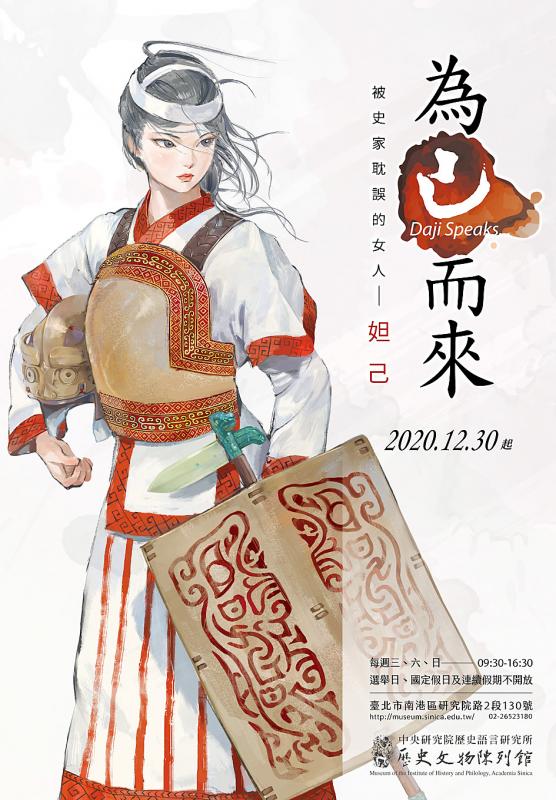Historical Chinese figure Daji (妲己), who is often described in literature as a malevolent spirit, was actually a female general who helped her husband, King Zhou (紂王) of the Shang Dynasty, in battle, a researcher said.
Historical texts generally describe Daji as King Zhou’s favorite concubine, and in novels and legends she is depicted as a malevolent fox spirit who was responsible for the downfall of the dynasty, said Hwang Ming-chorng (黃銘崇), a research fellow at Academia Sinica’s Institute of History and Philology.
However, research has shown that the queens of the Shang Dynasty wore armor and were required to follow the king onto the battlefield, he said.

Photo courtesy of the Institute of History and Philology
The museum commissioned graphic artist Chi You (蚩尤) to paint a likeness of Daji based on its records and artifacts about her to display as part of its permanent collection, he said.
“It’s a very formidable image. She is holding a shield with a zoomorphic pattern, and a bronze battle ax, and her face has the same characteristics seen in bronze masks from the era,” he said.
Huang, who is also director of the museum, said that women in the Shang Dynasty held high social status, and those of nobility were especially active in the royal court’s affairs.

Photo courtesy of the Tamsui Historical Museum
“Take Lady Hao (婦好) [the queen during the reign of King Wu Ding (武丁)], for example. She had to preside over ceremonies, participate in politics and even lead troops into battle,” he said.
Documents showed that Lady Hao was responsible for surrounding and capturing enemy forces, after Wu Ding and other generals drove them back, he said, adding that she would bring captured prisoners to Yinshang, which is now Anyang in China’s Henan Province.
“Queens during the Shang Dynasty all led troops into battle, so it stands to reason that Daji would have done so as well,” he said.
During the final battle of Shang, before the rise of the Zhou Dynasty, Daji and King Zhou escaped under the protection of the remaining Shang troops to the Deer Terrace Pavilion, where they committed self-immolation, he said.
“Confucians in later dynasties attempted to rewrite history by blaming the fall of the Shang on Daji, accusing her of meddling in politics,” he said.
Citing as an example Queen Bao Si (褒姒) of the Zhou Dynasty, Huang said that Chinese historiography often vilified women.
Bao Si is blamed in historical texts for the fall of Western Zhou, as it is said that King You (周幽王) lit warning beacons around the city numerous times to make her laugh, which allegedly resulted in an attack on the Zhou capital.
Huang said that this is untrue, as research has shown that there were no beacon towers in use during that period.

Chinese Nationalist Party (KMT) Chairman Eric Chu (朱立倫), spokeswoman Yang Chih-yu (楊智伃) and Legislator Hsieh Lung-chieh (謝龍介) would be summoned by police for questioning for leading an illegal assembly on Thursday evening last week, Minister of the Interior Liu Shyh-fang (劉世芳) said today. The three KMT officials led an assembly outside the Taipei City Prosecutors’ Office, a restricted area where public assembly is not allowed, protesting the questioning of several KMT staff and searches of KMT headquarters and offices in a recall petition forgery case. Chu, Yang and Hsieh are all suspected of contravening the Assembly and Parade Act (集會遊行法) by holding

PRAISE: Japanese visitor Takashi Kubota said the Taiwanese temple architecture images showcased in the AI Art Gallery were the most impressive displays he saw Taiwan does not have an official pavilion at the World Expo in Osaka, Japan, because of its diplomatic predicament, but the government-backed Tech World pavilion is drawing interest with its unique recreations of works by Taiwanese artists. The pavilion features an artificial intelligence (AI)-based art gallery showcasing works of famous Taiwanese artists from the Japanese colonial period using innovative technologies. Among its main simulated displays are Eastern gouache paintings by Chen Chin (陳進), Lin Yu-shan (林玉山) and Kuo Hsueh-hu (郭雪湖), who were the three young Taiwanese painters selected for the East Asian Painting exhibition in 1927. Gouache is a water-based

Taiwan would welcome the return of Honduras as a diplomatic ally if its next president decides to make such a move, Minister of Foreign Affairs Lin Chia-lung (林佳龍) said yesterday. “Of course, we would welcome Honduras if they want to restore diplomatic ties with Taiwan after their elections,” Lin said at a meeting of the legislature’s Foreign Affairs and National Defense Committee, when asked to comment on statements made by two of the three Honduran presidential candidates during the presidential campaign in the Central American country. Taiwan is paying close attention to the region as a whole in the wake of a

OFF-TARGET: More than 30,000 participants were expected to take part in the Games next month, but only 6,550 foreign and 19,400 Taiwanese athletes have registered Taipei city councilors yesterday blasted the organizers of next month’s World Masters Games over sudden timetable and venue changes, which they said have caused thousands of participants to back out of the international sporting event, among other organizational issues. They also cited visa delays and political interference by China as reasons many foreign athletes are requesting refunds for the event, to be held from May 17 to 30. Jointly organized by the Taipei and New Taipei City governments, the games have been rocked by numerous controversies since preparations began in 2020. Taipei City Councilor Lin Yen-feng (林延鳳) said yesterday that new measures by